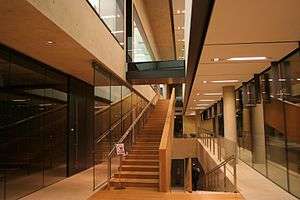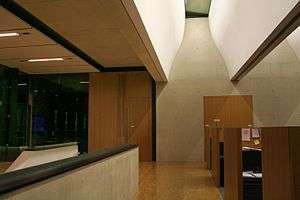Sainsbury Laboratory Cambridge University
The Sainsbury Laboratory Cambridge University (or SLCU)[1] is located in Cambridge University Botanic Garden. Its aim is to elucidate the regulatory systems underlying plant growth and development.
Directors
The inaugural director of the Sainsbury Laboratory Cambridge University is Professor Elliot Meyerowitz, currently on leave from the California Institute of Technology where he is George W. Beadle Professor of Biology. Meyerowitz earned his A.B. from Columbia University, and M.Phil. and Ph.D. degrees in Biology from Yale University. He joined the Caltech faculty after a postdoctoral period at the Biochemistry Department of the Stanford University School of Medicine. He was a Drosophila melanogaster expert before he became a pioneer of Arabidopsis thaliana research. Meyerowitz is well known for his contributions on the genetic and molecular basis of plant hormone reception, and on the molecular mechanisms of pattern formation in flower and shoot apical meristem development. He is a member of the American Academy of Arts and Sciences (1991), the U.S. National Academy of Sciences (1995), and the American Philosophical Society (1998), and is a foreign member of the French Academy of Sciences (2002) and the Royal Society (2004).
History
The Sainsbury Laboratory will house 120 plant scientists studying plant development and diversity in state-of-the-art laboratory facilities. The building was made possible by the award of an £82M grant from the Gatsby Charitable Foundation. Construction of the 11,000-square metre building, led by Kier Group, began in the private working and research area of the Botanic Garden in February 2008 and was completed in December 2010. The building also provides plant growth facilities and a home for the University Herbarium, which contains over one million pressed and dried plant specimens from around the world, including the great majority of those collected by Charles Darwin on the Beagle Voyage, and scientific research material relating to newly discovered plants from the 18th and 19th centuries.
Building
The Laboratory meets Cambridge City Council’s planning requirement for 10% renewable on-site energy generation through use of photovoltaic panels,[2] and has been awarded a BREEAM ‘Excellent’ rating. The Gilmour Suite, in a wing of the Sainsbury Laboratory, provides a public café and terrace for Botanic Garden visitors and is open all year during Garden public opening hours. The building was awarded the Stirling Prize for architecture in 2012.
| Architect: | Stanton Williams |
| Furniture consultant: | Luke Hughes[3] |
| Construction Start date: | February 2008 |
| Completion Date: | December 2010 |
| Date of Occupation: | January 2011 |
| Number of Occupants: | 150 |
| Gross Internal Area: | 11,000 m2 (120,000 sq ft) |
 Stairs
Stairs Auditorium
Auditorium Cubicles
Cubicles Exterior at night
Exterior at night
Artwork
| Artist Name | Work |
|---|---|
| Norman Ackroyd | Galapagos |
| Susanna Heron | Henslow’s Walk |
| William Pye | Starburst |
External links
- ↑ "Sainsbury Laboratory Cambridge University". Retrieved 1 May 2011.
- ↑ "The Sainsbury Laboratory, University of Cambridge". ARUP.
- ↑ "Sainsbury Laboratory". www.stantonwilliams.com.
Coordinates: 52°11′41″N 0°07′40″E / 52.194751°N 0.127774°E
